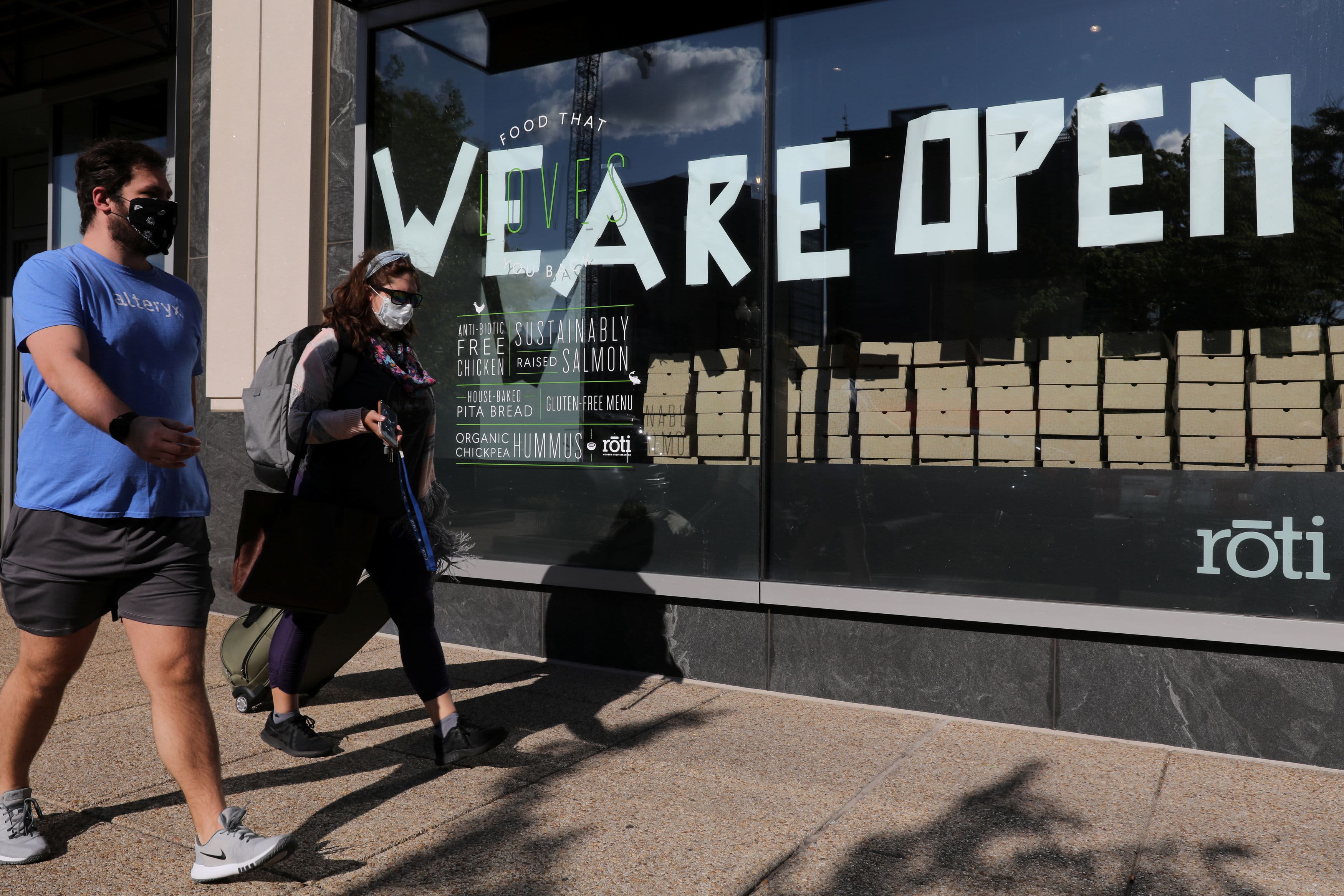Pedestrians in Washington pass a “We Are Open” restaurant sign during the Covid-19 outbreak on May 12.
Jonathan Ernst | Reuters
When it comes to the next coronavirus stimulus package and providing more direct financial aid, the question on most Americans’ lips is, “Will they or won’t they?”
One political analyst predicts it’s likely lawmakers will go for all three options on the table to provide direct financial help to Americans, even as Washington politicians engage in a war of words on Capitol Hill.
“There is going to be a pot of money, and it is going to go towards a combination of round two stimulus checks, continued unemployment and back-to-work bonuses,” said Ed Mills, Washington policy analyst at Raymond James.
The reason, Mills said, is that the climbing cases of coronavirus are in states that voted Republican in 2016 and could help push members of that party to provide more support, particularly because it’s an election year. Democratic politicians have already expressed their backing for more financial relief.
More from Personal Finance:
Many American expats are still waiting for their stimulus checks
Treasury Department, IRS will not extend Tax Day a second time
What unemployment benefits will look like without the extra $600 a week
Looming deadlines will also put pressure on lawmakers, Mills predicts. For 46 states, July 1 is the start of the fiscal year. Because 49 states aren’t allowed to run deficits, that will mean an uptick in state and local layoffs unless something changes, he said.
Meanwhile, the extra $600 weekly in unemployment benefits is set to expire in late July. That’s as many states are pressing pause on reopening plans as coronavirus cases rise.
“To the extent that it’s really looked at as one pot of money to deal with multiple issues, the easiest compromise is a lower dollar amount,” Mills said. “I think if I were to anticipate something that gets reduced first it would be the unemployment benefits.”
Congress is set to return from its holiday recess on July 20, at which point legislators will face pressure to take action.
“Sometime between the week of July 20 and the week of July 27, I expect a lot of pressure on Congress to get something done,” Mills said. “And I ultimately do expect that they will do it.”
More stimulus checks
The federal CARES Act that was passed in March included $1,200 stimulus checks for millions of Americans.
President Donald Trump signaled in a recent interview that he would be open to sending out more checks to Americans.
“We will be doing another stimulus package,” Trump said. “It’ll be very good. It’ll be very generous.”
The Democratic-led House has passed a bill called the HEROES Act that includes a second set of stimulus checks — only this time the payments would be more generous. Families would be able to receive up to $6,000, as dependents would get $1,200, up from $500, for a maximum of three children. Adult dependents and non-Americans would also be eligible for the stimulus funds.
Still, some experts say that stimulus checks don’t necessarily target those who need the money the most. For many Americans who are not living on federal benefits, the amount they received was determined by their 2018 or 2019 tax returns, not what they are earning this year.
But the money did have a stimulative effect on the economy, Mills said.
“There is a multiplier effect of the fiscal stimulus checks that really stabilized consumer spending,” Mills said. “We saw that discretionary income was up year over year in April.”
Extra unemployment benefits
The added unemployment benefits —$600 per week — were also put in place with the CARES Act and are set to expire in late July.
That has prompted many to petition Congress to continue those benefits. House Democrats outlined a plan to do just that in the HEROES Act, which would extend that extra money through January.
But this week Senate Majority Leader Mitch McConnell called the cash a “bonus not to go back to work.” Basic unemployment benefits should be continued, he said.
Senate Democrats also unveiled a proposal to continue those enhanced benefits until states’ unemployment rates fall, at which point they would be phased out.
Lawmakers may have less room for negotiation on this than they think, Mills said.
“The question that members of Congress haven’t answered is there are tens of millions of Americans who are unemployed,” Mills said. “There are not tens of millions of job openings right now.”
Some economists have proposed reducing the extra $600 per week to up to $400 per week in order to eliminate the disincentive to return to work.
Back-to-work bonuses
Republicans have favored another perk to give Americans an incentive to work again.
These so-called back-to-work bonuses could take different forms.
Sen. Rob Portman, R-Ohio, has a plan to give Americans who return to work a $450 weekly bonus. Rep. Kevin Brady, R-Texas, has proposed giving returning workers a one-time $1,200 payment.
What has not gotten enough discussion is the mechanics of how such a plan will work, Mills said.
When choosing between one-time or weekly payments, lawmakers will probably go for the method that is easiest to deploy, he said.
